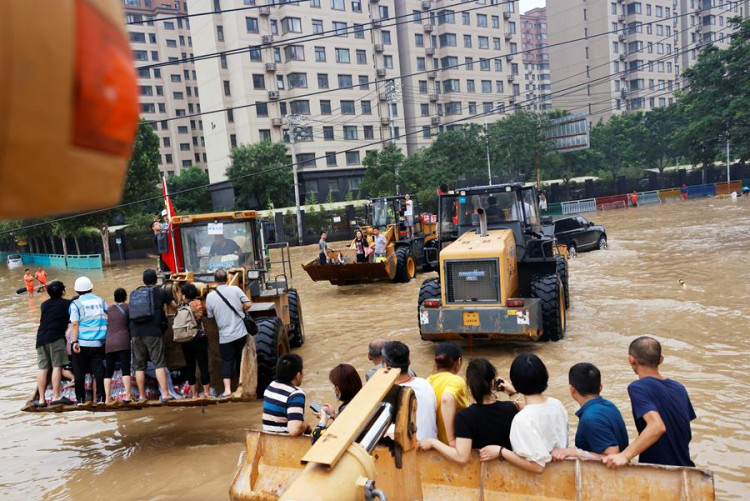Flooding in central China has affected more than 7.5 million people and killed 56. Five remain missing.
Power supplies were to be restored Saturday and "basic" water supply by Sunday, the South China Morning Post said, quoting officials.
Around 585,000 people have been temporarily removed from their homes while another 919,000 were relocated by the government, Henan provincial authorities said.
Record-breaking rainstorms - which dumped a year's worth of rain on and around Henan province - have moved north - inundating outer cities and regional areas and trapping people without fresh water or electricity, including hospitals, reports said.
Water levels reached chest high, a report from China state-run news agency Xinhua News Agency said Saturday.
Local reports said Xinxiang, with a population of 6 million people, was hardest hit. State news media said the Wei river had burst its banks and submerged villages near Hebi.
Tens of thousands were rescued from villages and farmlands, some by makeshift bridges, other by inflatable boats or in the buckets of backhoes and construction diggers.
Reports said rain triggered a landslide at Wangzongdian village in Henan province.
Limited resources forced trucks and kayaks to carry children and the elderly to safety - leaving behind thousands of exhausted villagers.
So far, China’s authorities have announced an unimaginable death toll of only ~33 dead & 8 missing in the Henan floods (contrast w/Germany flooding ~180 ppl lost). Some Weibo msg tracking reveals at least ~1,000 dead via photos/comment… #ChinaFloods #河南 #郑州 #洪水 #Zhengzhou pic.twitter.com/4fbEJF9UbG — Wes Andrews (@Wes_Andrews) July 22, 2021
Along the highways from Handan into Henan, farmlands and factories were submerged, with waters in some places reaching the tops of cars, SCMP said.
Main roads have been turned into rivers, with vehicles, debris and even people swept along by strong currents, BBC reported.
In the provincial capital of Zhengzhou, 12 people were killed when floodwaters submerged an underground subway line Wednesday night, the report said.
Official data shows around 98% of China's 654 big cities were prone to flooding, with rapid growth in recent years creating urban sprawls that covered floodplains with impermeable concrete, Reuters said.
Regional officials have described the volume of rain as a "once in a thousand years" phenomenon.
There is widespread consensus that extreme climate events are occurring with growing frequency worldwide.
"We know these big events are going to come along, and just don't know when," James Griffiths, a hydrologist at New Zealand's National Institute of Water and Atmospheric Research, said in quotes by Reuters.
As Henan's devastation continues, eyes are already monitoring an approaching typhoon in China's east coast.
Typhoon In-fa has brought heavy rain to northern Taiwan and Japan's southern islands, and the weather bureau predicted it will make landfall near Shanghai Saturday or Sunday.
<iframe width="1280" height="720" src="https://www.youtube.com/embed/dhgdgvyzk7A" title="YouTube video player" frameborder="0" allow="accelerometer; autoplay; clipboard-write; encrypted-media; gyroscope; picture-in-picture" allowfullscreen></iframe>






